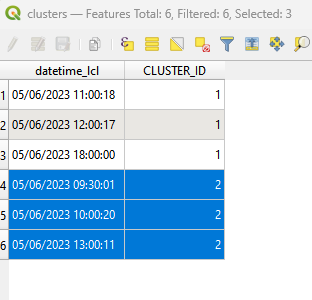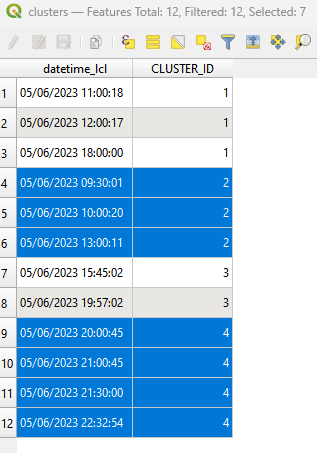I have several point layers with the attributes CLUSTER_ID (groups points in different clusters by unique ID) and datetime_lcl (timestamps). In each layer, I'd like to extract only the clusters in which time duration between consecutive points does not surpass 4 hours. If this is the case, all points belonging to the same CLUSTER_ID are to be ignored from the extraction.
As an example, the input:
datetime_lcl CLUSTER_ID
05/06/2023 11:00:18 1
05/06/2023 12:00:17 1
05/06/2023 18:00:00 1
05/06/2023 09:30:01 2
05/06/2023 10:00:20 2
05/06/2023 13:00:11 2
Would output:
datetime_lcl CLUSTER_ID
05/06/2023 09:30:01 2
05/06/2023 10:00:20 2
05/06/2023 13:00:11 2
This step will be embedded into a longer graphical model. I will be using the Extract by Expression tool with a custom function, but I don't know how to write such a condition in a way that returns TRUE for all features in valid clusters. What I have at the moment cannot be correctly interpreted by Extract by Expression:
from qgis.core import QgsFeatureRequest
from datetime import timedelta
@qgsfunction(args='auto', group='Custom')
def extract_cluster(layer, feature, parent):
# Get all unique cluster IDs from the layer
cluster_ids = set([f['CLUSTER_ID'] for f in layer.getFeatures()])
selected_features = []
# Loop through different cluster IDs
for cluster_id in cluster_ids:
features_in_cluster = layer.getFeatures(QgsFeatureRequest().setFilterExpression(f'CLUSTER_ID = {cluster_id}'))
# Initialize the cluster result as True
cluster_result = True
# Check if the cluster is valid based on the specified conditions
sorted_features = sorted(features_in_cluster, key=lambda f: f['datetime_lcl'])
for i in range(len(sorted_features) - 1):
current_time = sorted_features[i]['datetime_lcl']
next_time = sorted_features[i + 1]['datetime_lcl']
duration = next_time - current_time
if duration > timedelta(hours=4):
# Set the cluster result to False if any points in the cluster do not meet the condition
cluster_result = False
break # Exit the loop if a point is found that doesn't meet the condition
# If the cluster is valid, add all its features to the selected features list
if cluster_result = True:
for feature in features_in_cluster:
selected_features.append(feature)
# Return the selected features
return selected_features
How do I adapt this code to act as a custom function in Extract by Expression to extract all points from cluster IDs that meet my requirements?


